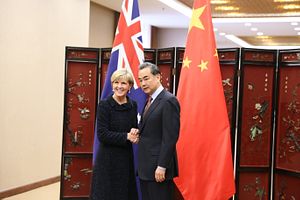Generally speaking, China and Australia are on good terms and this year what tensions are lurking in the background have not really flared up, not even after February’s release of the Defense White Paper (though Beijing did call it a Cold War relic the general reaction was one of disinterest). It helps that Australia has stayed largely quiet on the South China Sea.
Following the ruling by the Permanent Court of Arbitration on the dispute between China and the Philippines, relations have been a little rockier. And once the Global Times gets is back up, things become even more interesting (and invariably get heavy coverage in Australia).
China’s Global Times can be entertaining reading. The tirade against mining magnate-turned-politician Clive Palmer’s “rampant rascality” was an article for the ages.
Right now, the paper has decided that Australia is a “paper cat” – not in a confused translation but because the nation does not even merit the term “paper tiger” (anyway, everyone reserves that for ASEAN, which Australia is not allowed to join). This is because Foreign Minister Julie Bishop strongly supported the PCA ruling last week, forcing the excitable Global Times to deliver one of its inimitable smackdowns and explain Australia’s history thus:
“Australia is a unique country with an inglorious history. It was at first an offshore prison of the U.K. and then became its colony, a source of raw materials, overseas market and land of investment. This country was established through uncivilized means, in a process filled with the tears of the aboriginals.”
Ouch.
Actually Australia’s stance on the ruling, elucidated by Foreign Minister Julie Bishop, was almost a surprise. Canberra’s opinion is well known, but the accompanying firepower has been somewhat less so these days. Malcolm Turnbull has spent more of 2016 talking up trade and making references to large nations and a few near-obligatory Thucydides references without outright condemning China by name.
In a July 12 media release Bishop said “The Australian Government calls on the Philippines and China to abide by the ruling, which is final and binding on both parties.” A Chinese foreign ministry spokesman later said that China had protested against the “wrong remarks.”
“We hope that Australia can set more store by international law, and not treat it as a game… Honestly speaking, I’m a bit shocked at Bishop’s comments,” he said.
Bishop reiterated that Australia supported freedom of overflight and freedom of navigation patrols. And now the Global Times has not only suggested Australia be careful given, “Australia has inked a free trade agreement with China, its biggest trading partner, which makes its move of disturbing the South China Sea waters surprising to many.” And, more importantly, “Australia’s power means nothing compared to the security of China. If Australia steps into the South China Sea waters, it will be an ideal target for China to warn and strike.”
Essentially a state-controlled newspaper (in fact owned by the Party) is calling for a strike on Australian ships should they “step” into the South China Sea, a hysterical response to a “paper cat” and an ugly attack on a friendly nation and trading partner.
The Global Times is not exactly a perfect barometer of Beijing’s feelings, rather tabloid nationalism gone communist, with extra weirdness and an ESL fondness for confusing alliteration. However, given the Party oversees everything either someone had had a long lunch break or no one in Beijing sees anything wrong with threatening either Australia’s trade or its ships. No wonder the Lowy Institute’s latest poll found that while most Australians valued China and its culture 79 percent had issues with its style of governance.

































